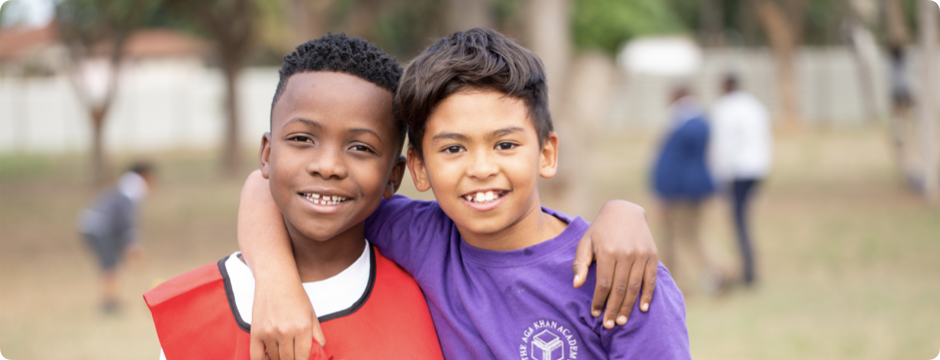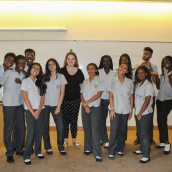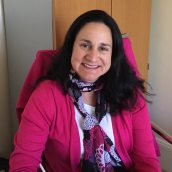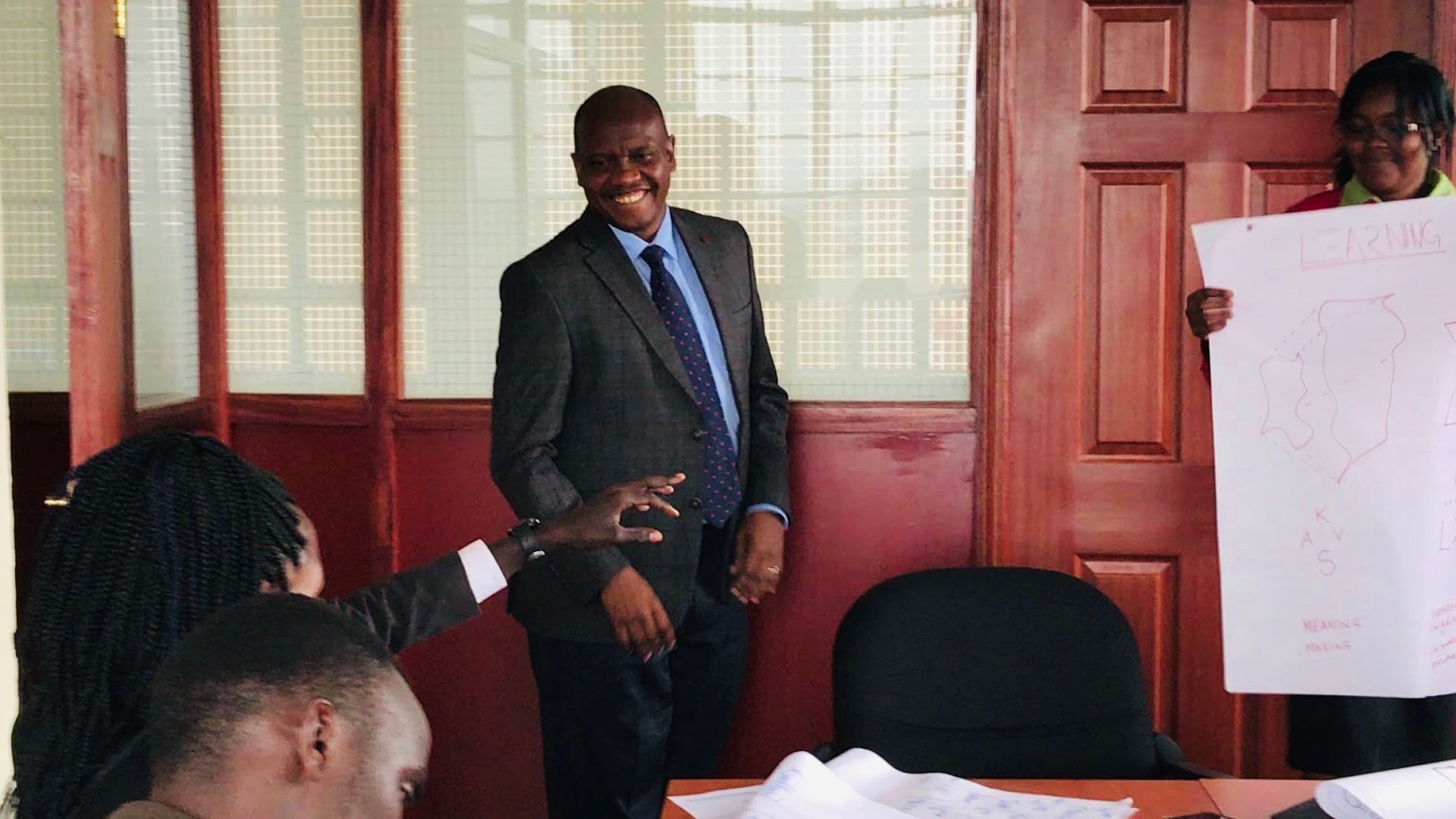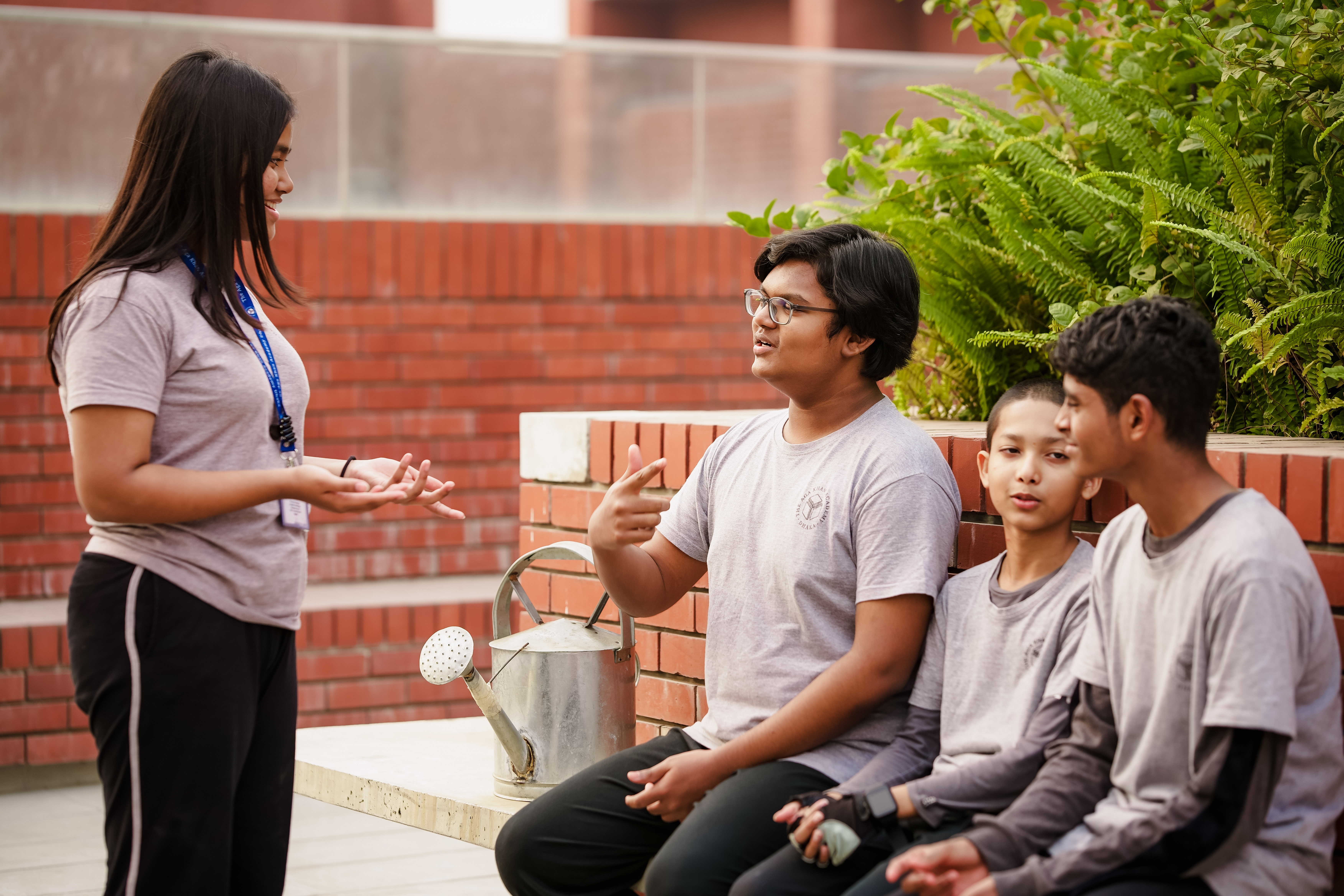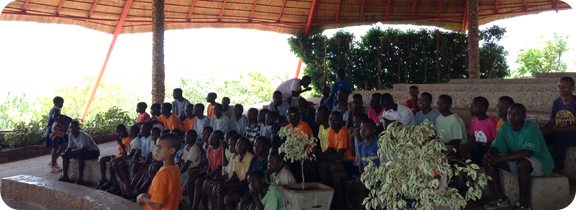
Community Service
Community service is an overarching and major facet of student education and experience at the Academies. Incorporated into student life and the curriculum, community service extends the educational experience beyond the classroom, informing students of the real-world implications of their studies. Through community projects with local organisations and groups, students gain a sense of the interconnectedness of their education with the world around them.
Students can participate in a variety of structured community initiatives and internships to learn about their place in the world.
By partnering with local Aga Khan Development Network agencies, students learn first-hand about the operations of an organisation and work towards making tangible contributions to the agencies.
In addition, community engagement provides an understanding of broad concepts such as human rights, dignity and autonomy, while emphasising the ethos of leaving the world a better place.
Examples of service projects from the Aga Khan Academy Mombasa:
Coast Rural Support Programme: Tree planting at Mtaa community reservoir. The reservoir was created as a community project. The outreach project involved planting 700 indigenous seedlings around the reservoir.
East African Quality in Early Learning: Creation of the Fun Reading Day initiative to promote early grade reading. Inspired by the common 1:10 ratio of students to books in local public primary schools, the first project was to collect books to establish a library at Ng’ombeni Primary School. Through a book drive and other community projects, students collected books and catalogued and prepared them for library use.
Our Junior School and Diploma Programme (DP) students visited the Ng’ombeni Primary School for group reading sessions. This project was then handed over to upcoming DP students to continue.
Education for Marginalised Children in Kenya (EMACK): Student’s council training workshop at Longo Primary School. Sarrah Sheikh came to know the Longo Primary School through her summer placement service. She went on to assist EMACK in establishing student leadership bodies, beginning with Longo Primary School. Topics covered went from effective leadership to communication tools, and the difference between prefects and elected student leaders. Three weeks after this project, the Kenyan government announced the phasing out of the prefect system and the introduction of elected student councils.
Madrasa Resource Centre: School painting project at Mpirani Nursery School. After visiting a school in disrepair, the DP students decided that a bright place was needed for the students to learn. They mobilised their fellow students to create bright learning materials and to repaint the school.
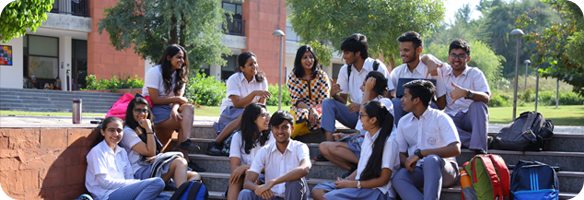
The Junior and Senior Schools
The Aga Khan Academy Hyderabad is made up of two schools, the Junior School and the Senior School, which together cater to students from grade 1 (age 6) to university entrance.
Junior School
All Junior School students follow the International Bacaalaureate (IB) Primary Years Programme (PYP). Through the PYP, our students learn to be confident, independent and creative learners.
The Junior School building has been designed to address the needs of younger children, with age-appropriate facilities and classrooms. In addition to the PYP classrooms, the building contains the Junior School library, and music, art and information technology rooms. There are also large playing fields and a playground.
Senior School
Students in the Senior School pursue either the IB Middle Years Programme or the IB Diploma Programme. Those from the local area can choose to attend as day students, while those from other parts of the country or region live on campus as part of the residential programme.
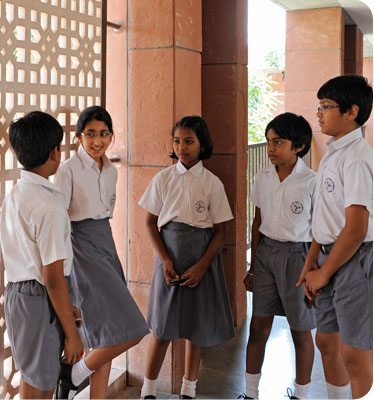 The Middle Years Programme is for students in grades 6–10. It helps them master essential skills and knowledge, and teaches them to be critical and analytical thinkers. The Diploma Programme is offered to students in the final two years of school. It is an internationally recognised and demanding programme that prepares students for university entrance.
The Middle Years Programme is for students in grades 6–10. It helps them master essential skills and knowledge, and teaches them to be critical and analytical thinkers. The Diploma Programme is offered to students in the final two years of school. It is an internationally recognised and demanding programme that prepares students for university entrance.
The school caters to both the intellectual and personal growth of students. It has a wide range of facilities that include:
- laboratories for the sciences and information technology
- art and music rooms
- library and resource centre
- career counselling centre
- student and teacher lounges
- cafeteria and dining area.
The building is networked so that computers become common resources for teachers and students. The multipurpose hall can be used for a variety of events ranging from theatre productions to parent–teacher meetings. The school also has swimming facilities as well as playing fields for soccer, field hockey and athletics.
For further information about applying to any of the programmes offered at the Aga Khan Academy Hyderabad, please refer to the admission requirements.
Harriet Chadwick: Committed to students’ success
Before we enter the 2019 – 2020 academic term, we would like to spotlight a few staff from AKA Mombasa who are going on to pursue new adventures in the upcoming academic year. Here, we take a look at Harriet Chadwick, who worked in the Humanities department, and her time at the Academy.
Harriet Chadwick is from Wakefield in West Yorkshire, England and has worked at the Aga Khan Academy Mombasa for three years as a Global Politics, Integrated Humanities and Theory of Knowledge teacher.
During her time at the Academy, Harriet said she has had a positive experience in her professional and personal life.
“I have learnt a lot about my subject, the IB Diploma Programme and the Middle Years Programme,” Harriet said. “I have enjoyed living in Mombasa and learning more about the local history and culture. I have also enjoyed some of the supportive relationships I have had with colleagues and support staff.”
As she will move on to new opportunities, Harriet said she will miss many things about the Academy and Mombasa in general.
“I will miss the best students who I have ever worked with; they are kind, hardworking and charming,” Harriet said. “I have thoroughly enjoyed learning more about the African continent through the curriculum I have taught and developed in both DP and MYP. I will miss the beautiful, tropical sites of Mombasa, such as the palm trees and beaches, minus the sweaty weather.”
As a teacher at the Academy, Harriet said she was able to help students appreciate Humanities with different learning resources.
“In year 7 I have embedded more creative and interactive learning approaches into the curriculum and contributed new resources,” Harriet said. “I have upheld and improved the popularity of Global Politics across the Academy and supported students to achieve their potential in their assessments. Some of the new approaches I have embedded in my DP teaching are to encourage continuous self-reflection, openness and communication from students about problems they are facing, as I believe mentorship is a key ingredient of good teaching, and the importance of collaboration, as opposed to competition, as a way to succeed.”
Although Harriet was teaching the students on how to succeed in Humanities, she said the Academy was also teaching her on how to succeed and become a better teacher.
“The Academy has taught me how to have more confidence in myself as an educator, that teaching involves multiple roles that I have learnt to balance and how to deliver concept-based, rather than content-based learning,” Harriet said. “Moving to another IB school, I will also feel more equipped to deliver the IB programme and I am very grateful to the Academy for providing me with this opportunity to grow.”
Harriet said she will begin a new teaching position that will help her plan her future better. However, she will be dearly missed by her colleagues, according to Susan Abuto, the head of department for the Humanities department.
“Harriet is one of the most passionate teachers I have ever interacted with in all of my teaching life,” Susan said. “She has a strong commitment towards the students and the lessons she has to deliver. She takes a lot of time and consideration into the quality of work she produces, whether it is a write-up, an assessment, a lesson plan or even departmental duties. She works very well with minimal supervision. While observing her lessons, you can see the student engagement and enthusiasm in the lessons. She motivates students to strive for the best they can achieve. To her students she is a darling. She cares about their welfare - feelings, engagement, performance, association, among other things. We will miss this commitment in the department and I know her students will miss her too.”
Bernardo Arsénio: Inspired teacher with a mission
Bernardo learned from the Aga Khan Academies that knowledge cannot just be seen as something that starts and ends in a classroom, but that knowledge should also be applicable outside the classroom to solve real problems in real life.
Bernardo Arsénio’s journey to becoming a teacher started when he was in year 11 of his school in Maputo, Mozambique. He had a history teacher who used to make fun of him in the classroom. “He used to come to my desk and ask me what I was doing in his class,” Bernardo says. The teacher did that continuously throughout the year. This affected Bernardo’s performance and motivation to be in that class. He failed the class that year.
“But then I realised I could not let him win… I knew that I am supposed to be in class to learn and not to just let someone de-motivate me because he thinks I shouldn’t be there." Bernardo went to talk to his principal who allowed him to attend the class with the same teacher in spite of failing the class. Bernardo later realised that he had to change his attitude if his teacher did not change his. “So I started attending his class – I used to do all the assignments, tests and homework. I never missed even one class in the year,” he says. Bernardo’s constant efforts were noticed by the teacher – Bernardo even achieved the highest mark that year. In turn, the teacher’s attitude towards him changed for the better.
By giving an example from his life, Bernardo explains why a healthy relationship between a teacher and a student is so important. Having a teacher who does not care and does not motivate the students can have negative consequences. “It almost happened to me and I did not let it happen. I used the negative motivation to change it into a positive one – that inspired me to become a teacher,” he says vehemently.
Bernardo pursued History at Eduardo Mondlane University in Maputo. After graduating with a degree in History and a minor in Information Management in 2015, Bernardo began teaching history in a private school – Centro de Exames de Admissão. Desiring even more teaching skills, Bernardo took a six-month postgraduate course in 2016 at Universidade Pedagógica, specialising in teaching methodology.
After a rigorous selection process, Bernardo was one of six individuals who were given the opportunity for a year-long exchange at the Aga Khan Academy in Mombasa, Kenya as part of the Teacher Preparation Programme. “I was lucky to be in the group to come to Mombasa. That was when my journey started,” he says. At the Aga Khan Academy Mombasa, Bernardo went through three weeks of intensive English training. He humbly says, “We got support from each and every person in the Academy. To reach this level, for me to be able to communicate and to go to class and discuss a certain topic was all because we got so much help. I was challenged in class and felt I could not do it. When you feel you cannot do it, you think you are drowning but find yourself swimming and coming out of water; it was very meaningful.” Bernardo ended up teaching Humanities and History to students in Grades 6 to 9.
When he came to the Aga Khan Academy Mombasa, the first thing Bernardo noticed was how the students played an important role in their education and how they took the responsibility for their own education. He says, “Back at home, the environment is where the teacher owns the knowledge and dominates the classroom.” He also remembers going to a Theory of Knowledge class at the Academy and noticing how the students did not learn by rote but were encouraged to discuss and make sense of what was being taught. The method by which the class was taught thoroughly impressed him.
At the Aga Khan Academy Mombasa, Bernardo mentions how amazed he was to see such cultural and religious diversity. He took note of the unity with which everyone participated in school, for example by focusing on their similarities instead of their differences. He was also impressed with how sports classes were taught at the Academy, utilised as an opportunity for students to get together and learn about their similarities and differences. Bernardo found the people in Mombasa very warm and friendly and he did not feel far away from home.
Bernardo is now back in Mozambique, teaching at the Aga Khan Academy Maputo. He will continue to be a Humanities and History teacher and is helping support the growth of the Academy as they implement the International Baccalaureate (IB) Middle Years Programme. He strongly feels that a teacher should connect what is being taught to real life. For Bernardo, a teacher must motivate and support the students, and should enable students to develop and become better people.
Theresa Urist: A passion for education
An Interview with Theresa Urist, Global Director of University Counselling at the Aga Khan Academies
Theresa Urist has always loved to learn. Growing up in a rural community in New York state, where many of her classmates did not go on to college, her thirst for education led her to Stanford, where she earned a B.A. with Honours in American Studies and tutored high school students in her spare time. She realised that she loved teaching as much as she loved to learn, so she secured a spot in the Master of Education programme at Harvard University before becoming a high school teacher and, later, a university counsellor.After more than two decades as a counsellor in the United States, where she directed college counselling at three different schools, Theresa’s desire to support students from poor communities led her to the Aga Khan Academies, where she became the Global Director of University Counselling in 2015. Her role is essential to the mission of the Academies, which aim to produce effective, ethical leaders with the skills and knowledge to support positive development in their societies. As the networks’ university expert, she coordinates the university counselling process so that the students are admitted to and select universities where they will flourish in their chosen fields.
Aga Khan Academies writer Alia Dharssi sat down for a conversation with Theresa about her passion for education, her work at the Academies and what makes her tick. Their conversation has been edited for clarity and length.
Alia: Can you tell me about yourself and how you wound up becoming a university counsellor?
Theresa: I was born and raised in a very small town on Long Island in New York State. I wanted to be a journalist as a kid and wound up writing for my college daily newspaper, where I had a 1am news deadline. It was crazy and frenetic. I realised that’s not what I wanted to do, but I had also begun tutoring at a nearby school and I really, really loved working with the students. That experience put me in the direction of education. I earned a Masters of Education from Harvard and became an English and history teacher. In 1995, I answered the call to become an interviewer for Harvard undergraduate admissions. I loved talking to students about their future plans and goals during the interviews, so I put the pieces together and entered the field of university counselling.
Alia: What makes you passionate about education?
Theresa: The way I see it, education is the key to social mobility. When students – like the ones on full financial aid at the Academies who are selected through our talent identification programme – become educated, it’s something that doesn’t just benefit them. It benefits their family and their community and has a ripple effect. I see it as a way that entire communities can get themselves out of poverty in one generation. Education is the most concentrated way you can effect lasting social change. That’s what gets me up in the morning every single day to do the work that I do.
Alia: Have you always thought about education in this way?
Theresa: Education is always something that has been at the forefront of my mind. My parents were well educated, but I grew up in a very rural community where a lot of people had not studied beyond the secondary level. So, when I went off to university at Stanford 3,000 miles away from home, it was an eye-opening experience. I was surrounded by very motivated people with a lot of interesting ideas. I had been a big fish in a little pond in my secondary school because I was somebody who was very hungry for education. I tried to access a lot of educational opportunities despite the fact that I attended a regional, rural public high school that did not offer the most enriching academic experience. College was the first time in my life I was surrounded by students who had had very different life experiences, who had gone to schools that were very academically rigorous, who were incredibly curious. It was vibrant and transformative.
Alia: That sounds like an amazing experience. You started working at the Academies after two decades of working as a counsellor in the US. What inspired you to take the job?
Theresa: When I heard about the job, it seemed like a perfect fusion of my interests. The mission of the Academies in terms of providing educational opportunities for students regardless of their means is one that spoke to my heart. In two decades of counselling, I had gone from working in college prep, private schools to working at an urban public school with very low-income students. There are so many talented kids whose socioeconomic background prevents them from accessing very good academic opportunities in places where they’re going to flourish. And so, in my own job search, I was looking for an organisation that provided such opportunities for students in need. I was also interested in international education – in addition to being a US citizen, I’m also a Swiss citizen and I’ve spent a good amount of time overseas – so this position really spoke to me.
Alia: What kinds of struggles have you seen students from poor socioeconomic backgrounds face when it comes to getting a good education?
Theresa: In my last role in the US, I was working in an urban public charter school with low-income students from all over the world. The majority of my students were first generation, meaning their parents had immigrated to the US. They did not speak English at home and they would be the first in their families to access higher education. I helped them navigate the system. Many of their families came from countries where poverty was a problem. Just getting to the US was a big hurdle. In addition, education is very, very expensive in the US, so it was a challenge for those students to figure out how to finance their education.
Alia: That sounds quite different from your role at the Academy. How do the two experiences compare?
Theresa: I certainly have a lengthy background in university counselling, but when I was based in one single school, it was quite limiting in a lot of ways. My work at the Academies requires a much larger scope in terms of finding what universities are a best fit for particular students. I had good working knowledge of US and Canadian schools coming in. What’s newer for me is some of the other schools beyond that, particularly schools in the UK. It’s given me a greater global perspective on education in terms of the different programmes that exist and the ways in which universities are trying to position themselves globally.
Alia: Can you tell me about your trips to the Academies? What was your first impression?
Theresa: My first visit was to Hyderabad. I found the students compelling and the facilities stunning. Everything exists in the service of students and forwarding their academic and personal growth. When I first made a visit to the Mombasa school, I found the level of arts that students were doing and the level of introspection that went into what they were creating was incredibly deep and heartfelt. It was more advanced than what I’d seen at other schools. A lot of the students’ art projects dealt with issues of social justice and presented very clear messages that made me hopeful. Seeing that level of attention given to something that is often peripheral at other schools speaks volumes about the Academies.
Alia: Absolutely. Why is your role important to the Academies’ vision?
Theresa: As we grow as a network, we want to make sure we are offering a consistent quality of university counselling services across campuses, so that’s a really important part of my work. We want colleges and universities across the globe to know who we are and why they should admit our students and fund them, so a big part of my job is conducting outreach to universities and colleges. When a university takes a risk on a student and that student does well, then it knows that it has a viable academic candidate and will admit more and more students from our schools. My job is to try to create pipelines for students at academically rigorous universities that recognise who we are and why our students are so interesting and compelling.
I also conduct some professional development like workshops for faculty members where they receive training about best practices for writing recommendations for students. Both campuses are now on the Naviance platform, which is an online portal that allows students to track all their applications and send documents to universities electronically. We also track data on the admissions process on the platform.
Alia: That’s important work, but now for a less serious question. What do you do when you’re not busy counselling?
Theresa: I love to cook and bake. In particular, I like making fancy cakes and tortes. Every year, during the holidays, I create a gingerbread house. They’re not basic ones; I have architectural plans. Last year, I made a church with candy stained glass windows. The year before, it was a Victorian house. Every year I do a different structure.
Alia: That’s quite a hobby. Do you eat the houses?
Theresa: Yes, eventually I do. My friend’s kids help me decorate the house, it stays up and then it gets destroyed. So that’s one of my hobbies. To balance my baking interests, I was a distance runner and had run a bunch of marathons, but I had to stop after an injury. But I still really like to be active. I like hiking and skiing and being outside.
Alia: Is there anything else you’d like to say?
Theresa: I love the work I do. I feel like mine is a really important role, so I’m just very grateful for the opportunity to work on behalf of the Academies.
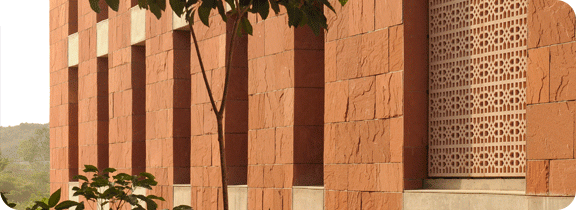
Quick Facts About the Academy
The Aga Khan Academy Hyderabad (established 2011)
Location: South of the city of Hyderabad, near the Rajiv Gandhi International Airport
Campus size: 100 acres of land allocated by the state government
Campus design and construction:
- total built area: approximately 500,000 square feet
- master facilities planners for the Academies: Sasaki Associates Inc. of Boston, USA
- campus design: award-winning architect Bimal Patel of HCP in Ahmedabad, India
- campus construction: Shahpoorji Pallonji
Curriculum
The Aga Khan Academy Hyderabad is an International Baccalaureate (IB) World School
IB programmes:
- Primary Years Programme: grades 1–5;
- Middle Years Programme: grades 6–10;
- Diploma Programme: grades 11–12
Aga Khan Curricular Strands, implemented across the curriculum:
Ethics, Pluralism, Cultures (with an emphasis on Muslim civlisations), Governance and Civil Society, and Economics for Development
Staff and students
Faculty numbers: 8 senior management, 63 Senior School faculty, 19 Junior School faculty, 7 working in both Senior & Junior Schools, 42 administrative staff
Number of students currently enrolled: 632 day and residential students in total: 140 day students in the Junior School; 492 students in the Senior School, with 245 in residence
Numbers of students and teachers at full capacity: 750 students and 90 teachers, with over 40% of students receiving some form of financial aid
First IB Diploma Programme graduating class: 2014
Residential students
Number of residential students: 245 currently, with full capacity of 300 students
Number of students per room: Between 2 and 4, with second year Diploma Programme students in single/double rooms
Residential facilities: Student lounge with multimedia and entertainment equipment, study areas, laundry facilities, dining hall
Campus facilities
Sports facilities: 25-metre swimming pool, diving pool, gym, two regulation-sized basketball courts, three cricket pitches with net practice facilities, two tennis courts, four squash courts, athletics track, junior play area, hockey field, training field, 2.5 km cross-country track
Arts facilities: Rooms for fine arts, music, dance; individual music practice booths; music recording area; amphitheatre performance space
Academic areas: Junior School classrooms, Senior School classrooms, science and computer laboratories, library and resource centre, arts facilities, music and dance studios
Residential buildings: 6 residential blocks: 3 male and 3 female; 6 dorm parent apartments in each block. Each block has a central atrium, lounge area, patio and laundry facilities.
Health and Wellness Centre: 12 beds and a full-time, qualified nurse
Professional Development Centre
The Aga Khan Academy Hyderabad is home to a Professional Development Centre for the advancement of teachers. The primary objective of this centre is to provide professional development that will benefit the wider school system in India.
Programming began in June 2010 with a Professional Learning for Educators Series for teachers in local government, independent and not-for profit schools.
The Aga Khan Academies network
18 Academies are planned in Africa, South and Central Asia, and the Middle East.
3 Academies are currently operating: Mombasa, Kenya (opened 2003); Hyderabad, India (opened 2011); and Maputo, Mozambique (opened 2013).
When complete, the network will represent 2,000 teachers and 14,000 students (boys and girls), with 1,400 graduates annually.
Institutional partnerships include:
Agencies of the Aga Khan Development Network; the International Baccalaureate, universities including the University of British Columbia, Concordia University, Ryerson University, University of California - Los Angeles, California State University - Northridge
Government partnerships include:
The Province of Ontario, Canada; the Ministry of Education, Science and Technology, Kenya; the Ministry of Education and Human Development, Mozambique; the French Development Agency (AFD); the French Mozambican Cultural Centre (CCFM - Centro Cultural Franco-Mozambicano); the Department of School Education, Telangana, India
Download the Quick Facts sheet here. ![]() AKA-Hyderabad-Quick-Facts.pdf
AKA-Hyderabad-Quick-Facts.pdf
